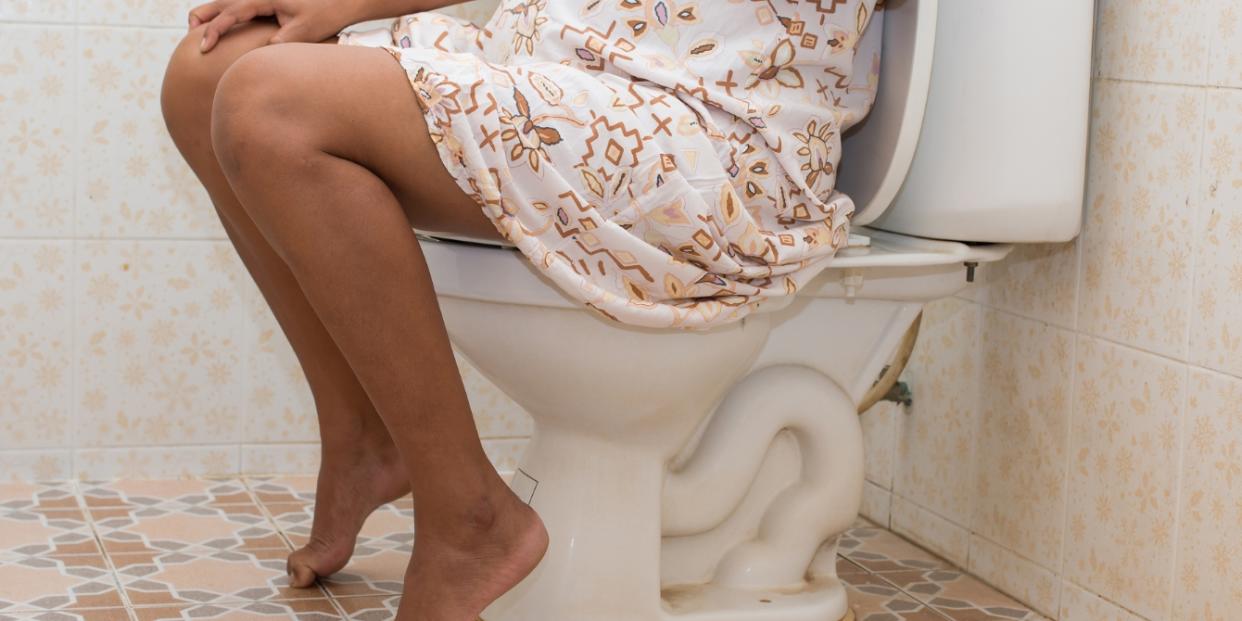Why are so many postpartum women constipated?

When it comes to disrupting your GI tract, nothing compares to the havoc brought on by pregnancy and childbirth. Your bowels love routine, they love regularity and they love a stress-free existence. As wonderful as having a new baby may be, it provides none of those things. Sleeping schedules disappear, eating habits crumble, hormones are completely in flux, and whether you’ve had a C-section or vaginal birth, your body is still healing and recovering for several months after. So it should come as no surprise that postpartum constipation is common: for as many as 3 in 5 postpartum women, pushing out poop feels like a serious struggle.
Technically, constipation is defined as a bowel disorder characterized by infrequent, hard stool that can be difficult or even painful to pass. You’re probably constipated if you experience any of the following during more than 25% of your bowel movements (BMs).
Signs of constipation
Straining to get the poop out
Feeling like you can’t get all the poop out
A blockage inside your rectum
Have hard or lumpy stool
Using your hands to help things along
Fewer than 3 poops a week
Let’s take a deeper dive into the top reasons why postpartum pooping can turn into a daily drama.
5 potential reasons behind postpartum constipation
1. A change in diet plus medications can lead to constipation
Many hospitals and birthing centers will restrict food to birthing people during labor in order to avoid complications in the case of an emergency cesarean delivery. This interruption to regular meals—and change in the types of foods you’re eating—can lead to constipation.
In addition, if there is significant blood loss during delivery, iron supplements may be recommended postpartum which is also often tied to constipation. Certain pain-relieving medications that are prescribed postpartum, including opioids, have also been linked to constipation.
2. Lactation can cause dehydration, which makes poop harder to pass
Breast milk is 87% water. During lactation, this water is taken from the lactating parent in order to produce milk. This can lead to an increased risk of dehydration which is why the recommended fluid intake for an adult woman is 2 liters (L), but if they are lactating, this increases by 700 mL. Dehydration is a well-known contributor to constipation.
3. Perineal tears and/or hemorrhoids can make pooping painful
Between 53% to 79% of vaginal births will result in a perineal tear or laceration. While most of these tears are not severe enough to lead to lasting dysfunction, in those first few weeks postpartum, while stitches are still in place and everything is swollen, a tear of any kind can be enough to cause a person to fear and even avoid passing a bowel movement.
What’s more, anal fissures and hemorrhoids are common in both pregnancy and in the postpartum period, further contributing to pain and discomfort with passing bowel movements and potentially exacerbating constipation in the postpartum period.
4. Prolapse can set off a domino-effect of pooping problems
The likelihood of developing pelvic organ prolapse increases 10 times after a vaginal delivery. A prolapse is a condition in which the pelvic organs become displaced due to decreased ligamentous support and potentially weakened pelvic floor muscles.
Most people with a prolapse have no symptoms at all, but for some, a prolapse can make everyday tasks, like passing bowel movements, much more difficult. With a prolapse, there is more room for movement of the pelvic organs, so instead of the rectum staying in place as you try to push for a BM, the stool-filled rectum just leans over. If a push causes movement of your rectum instead of your stool, you may try to push harder and begin straining and you may experience incomplete emptying, both of which are signs of constipation. Incomplete emptying and ineffective pushing can also lead to constipation.
5. Bowel movements often go MIA after C-section birth
Constipation is especially common in the first 2-3 days after a C-section due to a condition referred to as “ileus,” which is a pause in bowel function during and immediately following a major surgery. Your medical provider will be monitoring when you pass gas or a bowel movement after delivery, as this is a sign that normal bowel function has resumed (chewing gum may help!). But when you also consider the lack of food intake, lack of activity, increased abdominal pain and abundant use of medication that is also associated with a c-section, it is not uncommon for women who have had a C-section birth to not have a bowel movement for several days postpartum.
What to do about postpartum constipation
If you are newly postpartum and experiencing constipation, reach out to your medical provider right away for support. They may recommend increasing your fiber and fluids, or possibly trying a laxative that’s safe for postpartum or breastfeeding. If you are more than 6 weeks postpartum and continue to struggle with constipation, ask your doctor for a referral to a pelvic floor physical therapist who specializes in postpartum care, like the ones at Origin.
Pregnancy and delivery are some of the most common causes of pelvic floor muscle dysfunction and a strong, well-coordinated pelvic floor is integral to effectively and effortlessly passing a bowel movement. If your pelvic floor is dysfunctional, it can contribute to or even cause constipation.
Your pelvic floor PT will consider your diet and lifestyle, your pregnancy and birth, your perineal tear or C-section scar tissue, and/or your hemorrhoids and prolapse in establishing a plan of care that will help reduce your constipation and help you poop effortlessly postpartum. Because the less time you spend in the bathroom, the more time you can spend doing things that you actually want or need to do (like taking a nap)!


